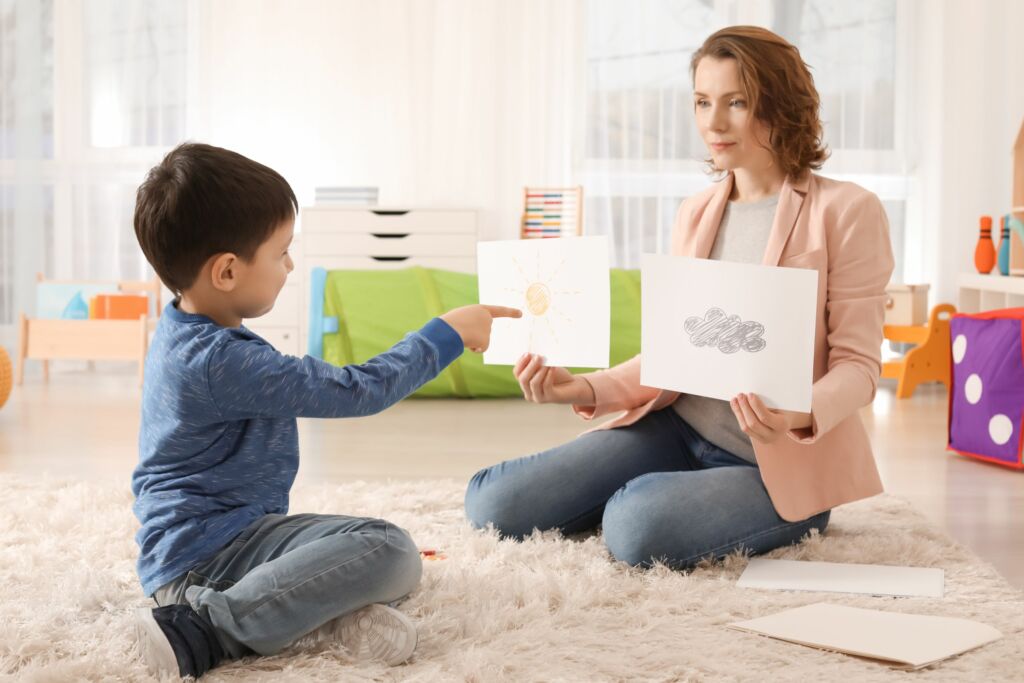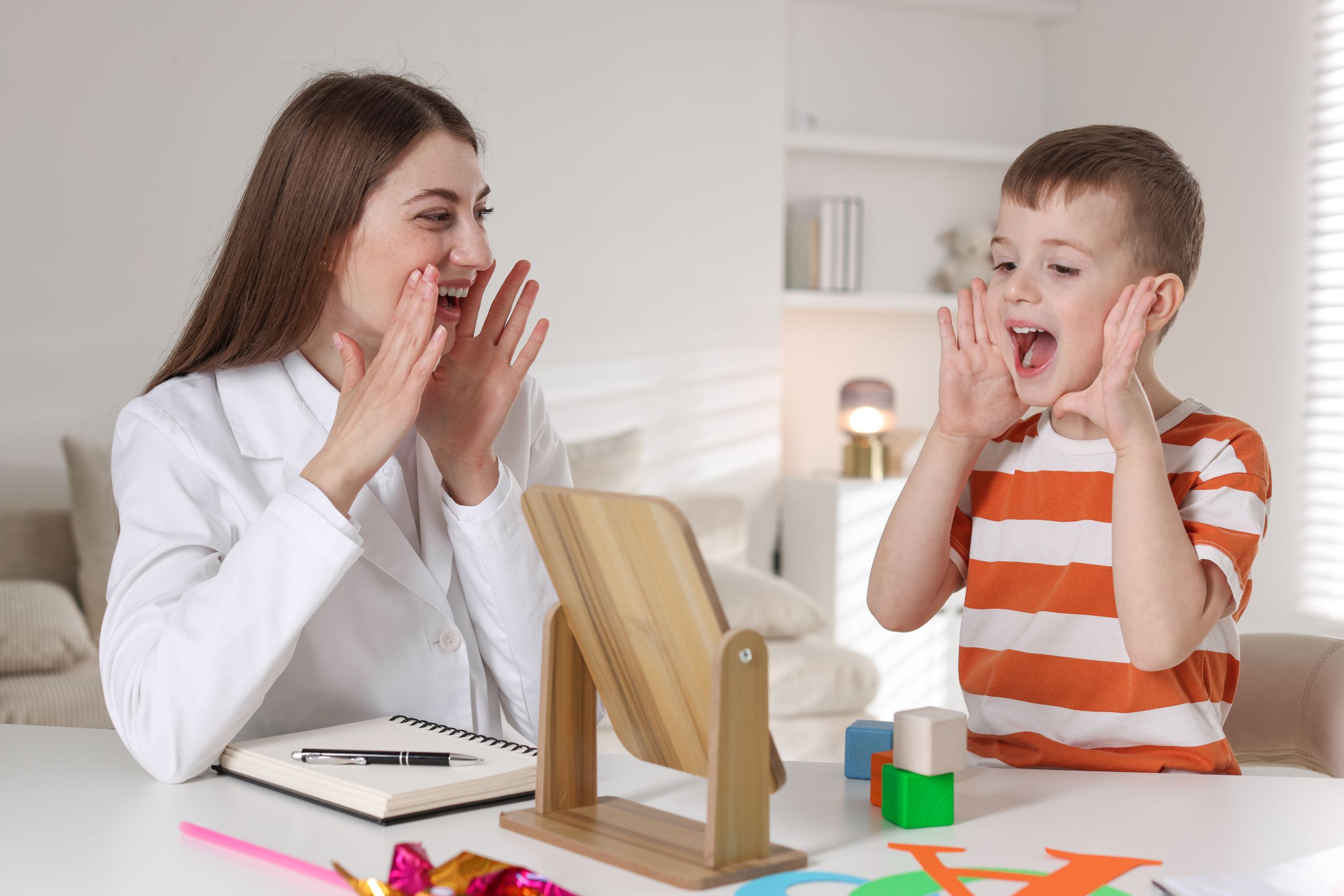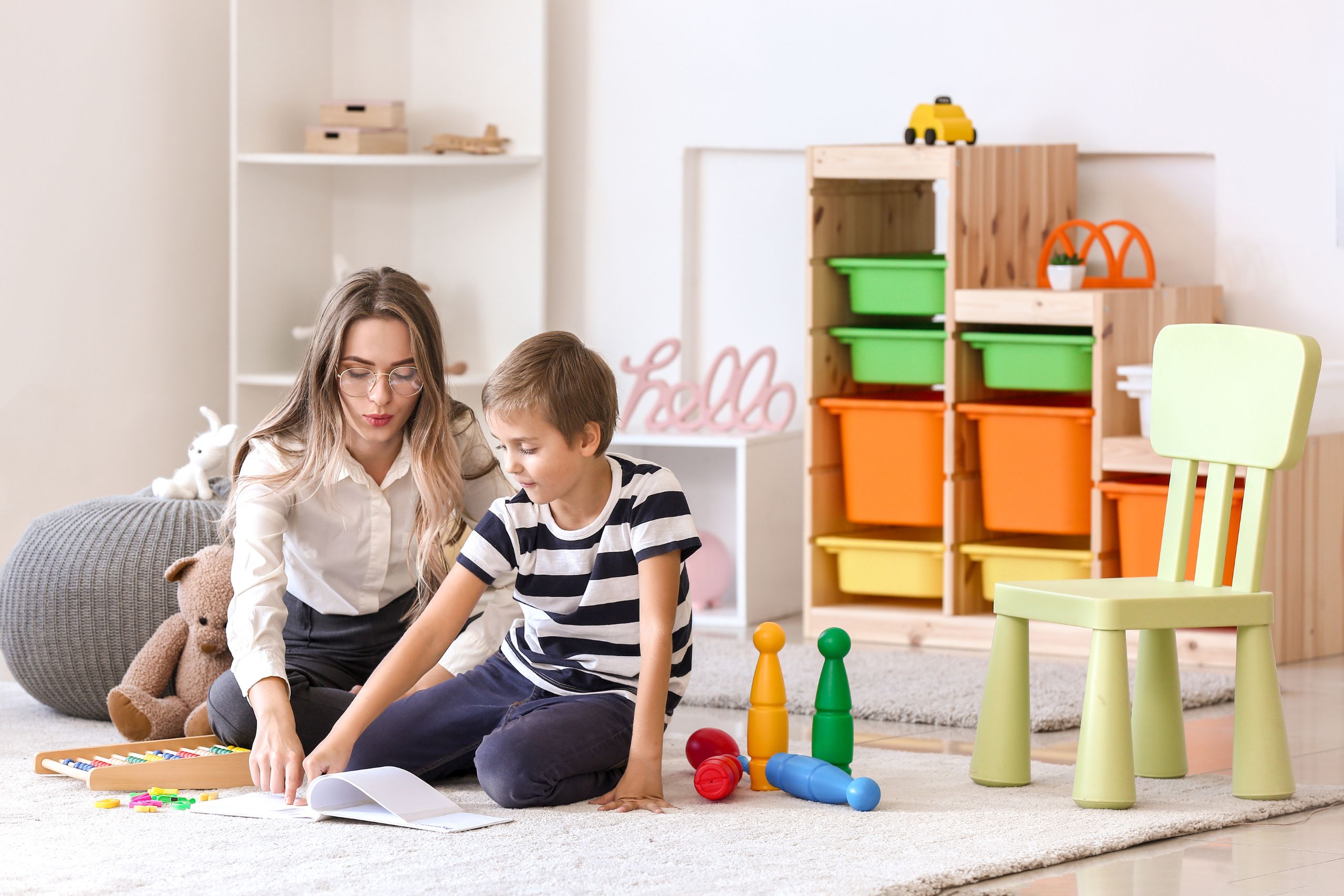Blog
The “Publix Run” Success Guide: Using Fort Myers ABA Therapy Strategies to Turn Grocery Shopping Into a Learning Opportunity
Every parent knows that moment: You’re standing in the cereal aisle at Publix, your child is melting down because they can’t have the box with the cartoon character, and you’re wondering if you should just abandon the cart and leave. For parents of children with autism spectrum disorder (ASD) or other developmental disabilities, the grocery store can feel like navigating an obstacle course—bright lights, overwhelming sounds, countless temptations (or aversions), and the pressure to complete your shopping while managing your child’s needs.
But what if that same stressful grocery trip could become one of your child’s most valuable learning opportunities?
At FOCUS Therapy in Fort Myers, our multidisciplinary team has seen countless families transform everyday activities into powerful teaching moments using Applied Behavior Analysis (ABA) strategies. The grocery store isn’t just a place to buy food—it’s a real-world classroom where children can practice waiting, following directions, making choices, communicating needs, and so much more.
Why Grocery Shopping Matters More Than You Think
With approximately 1 in 31 children identified with autism spectrum disorder according to the CDC’s Autism and Developmental Disabilities Monitoring Network, more families than ever are seeking effective strategies to help their children navigate daily life. While it might be tempting to use delivery services or leave your child at home, these everyday outings provide irreplaceable opportunities for skill development.
The skills your child practices during a 20-minute Publix run—like waiting their turn, following a visual schedule, making appropriate requests, and tolerating sensory input—are the same skills they’ll need for success in school, social situations, and eventually, independent living. When we avoid these challenging situations, we miss opportunities to teach resilience, flexibility, and real-world problem-solving.
Our Fort Myers ABA therapy team members have worked with hundreds of families to develop strategies that make community outings not only manageable but genuinely beneficial for child development. The key is approaching these trips with intention, preparation, and evidence-based techniques.
Understanding Why Grocery Stores Are Challenging
Before we dive into solutions, it’s important to understand why grocery stores can be particularly difficult for children with autism or other developmental disabilities:
Sensory Overload: Fluorescent lights, beeping scanners, background music, announcements over the PA system, the hum of refrigerator units, and dozens of conversations happening simultaneously create a sensory environment that can be overwhelming. For children with sensory processing differences, the grocery store can feel like being bombarded from all directions.
Unpredictability: Even if you visit the same store, variables constantly change. Different cashiers, rearranged displays, out-of-stock items, varying crowd levels, and unexpected encounters (like running into a neighbor) make it difficult for children who thrive on routine and predictability.
Delayed Gratification: Children are surrounded by preferred items—cookies, chips, toys, colorful packages—but can’t have them immediately (or at all). This requires impulse control and the ability to wait, which are skills many children with developmental disabilities are still learning.
Extended Duration: Unlike a quick errand, grocery shopping often takes 20-45 minutes, requiring sustained attention, cooperation, and behavioral regulation over time.
Abstract Concepts: Following a shopping list, staying with a caregiver in a large space, understanding that we look but don’t touch, and comprehending that we pay before we eat are all abstract concepts that require explicit teaching.
Understanding these challenges allows us to address them proactively with Fort Myers ABA therapy strategies that set both parent and child up for success.

The Power of “First/Then” Boards
One of the most effective and widely-used ABA strategies for making grocery shopping successful is the “First/Then” board—a simple visual support that shows children what they need to do first and what will happen afterward.
- Categorized: ABA Therapy, ADOS Testing, Behavior Therapy
- Tagged: ABA therapy, Fort Myers ABA Therapy, Fort Myers occupational therapist
The “Playdate Playbook”: How to Facilitate a Successful Home Playdate for a Child with Social Communication Delays
For many parents, organizing a playdate seems like second nature—invite a friend over, let the kids play, and supervise from the sidelines. But for parents of children with social communication delays, including those with autism spectrum disorder (ASD), ADHD, or language processing challenges, playdates can feel overwhelming. The Fort Myers ABA therapists at FOCUS Therapy have witnessed countless families struggle with these social situations, unsure of how to create successful peer interactions for their child.
The good news? With proper preparation, structure, and support, playdates can become powerful opportunities for skill-building, confidence, and genuine friendship development. According to the Centers for Disease Control and Prevention, approximately 1 in 36 children has been identified with autism spectrum disorder, which means many families are navigating these same challenges. This comprehensive playdate playbook will equip you with evidence-based strategies developed through years of Applied Behavior Analysis (ABA) practice to help your child thrive in social settings.
Understanding Social Communication Delays

Before diving into playdate strategies, it’s essential to understand what social communication delays look like. Fort Myers ABA therapists who work with diverse learners can explain that these challenges can manifest in various ways. Children with social communication difficulties may struggle with turn-taking, reading facial expressions and body language, initiating or maintaining conversations, understanding unwritten social rules, sharing toys or attention, managing emotions during conflict, or transitioning between activities.
These challenges don’t mean your child can’t develop meaningful friendships. Rather, they indicate that your child needs more explicit teaching, practice, and support in social situations than neurotypical peers. ABA therapy excels at breaking down complex social behaviors into teachable components, providing the scaffolding children need to succeed.
Phase 1: Pre-Playdate Preparation
- Categorized: ABA Therapy
- Tagged: ABA therapy, behavior therapy, Fort Myers ABA Therapy
Gestalt Language Processing 101: Fort Myers Speech Therapists Explain When Kids Learn Language in “Chunks” or “Scripts” (Echolalia)
If your child repeats entire phrases from their favorite movies, recites commercials word-for-word, or echoes sentences they’ve heard before, you might be witnessing something remarkable: gestalt language processing. For years, parents and professionals viewed this “scripting” or echolalia as a problem to be eliminated. Today, experienced Fort Myers speech therapists understand that these language patterns often represent a natural and valid path to communication.
At FOCUS Therapy, we recognize that not all children learn language the same way. Understanding gestalt language processing can transform how we support children on their unique communication journeys.
What Is Gestalt Language Processing?
Gestalt language processing (GLP) refers to a style of language acquisition where children learn language in multi-word “chunks” or complete phrases before breaking them down into individual words. Instead of building up from single words to phrases (the analytic approach most children use), gestalt language processors start with the whole and work toward the parts.
Think of it this way: while an analytic language processor might progress from “ball” to “big ball” to “throw big ball,” a gestalt language processor might start by saying “Let’s get out of here!” (heard from a favorite movie) and only later learn to use parts of that phrase or understand the individual words within it.
The term “gestalt” comes from German, meaning “whole” or “form,” perfectly capturing how these children initially perceive and use language as complete units rather than assembled components.
- Categorized: Speech Therapy
- Tagged: Fort Myers speech therapy, speech therapists, speech therapy
Managing Therapy Schedules: Tips for Busy Southwest Florida Families
Juggling therapy appointments alongside work, school, extracurriculars, and family life can feel overwhelming for Southwest Florida families. Between tourist traffic on US-41, severe weather, and the the constant hustle of daily life for parents with young children, our Fort Myers ABA therapists understand that maintaining consistent therapy schedules presents real challenges, particularly when a child receives multiple therapy services. Yet consistency remains one of the most critical factors in your child’s therapeutic progress.
Whether your child receives services from Fort Myers ABA therapists, speech-language pathologists, or occupational therapists, establishing and maintaining a reliable therapy routine can transform outcomes. Here’s how busy families in Southwest Florida can successfully manage therapy schedules while keeping stress levels manageable.
Why Consistency in Therapy Matters
Before diving into scheduling strategies, it’s important to understand why consistency is so vital. Research consistently demonstrates that frequency and regularity of therapy sessions directly impact skill acquisition and retention. According to the Centers for Disease Control and Prevention, early intervention services can significantly improve developmental outcomes, but these benefits depend heavily on consistent participation.
When children attend therapy sessions regularly:
- Skills build progressively. Each session builds on the previous one, creating a scaffolding effect for learning.
- Generalization improves. Regular practice helps children transfer skills from the therapy room to home, school, and community settings.
- Relationships deepen. Consistent attendance allows therapists to develop stronger rapport with your child, leading to more effective interventions.
- Data becomes meaningful. Therapists can accurately track progress and adjust treatment plans when attendance is consistent.
- Regression is minimized. Gaps in therapy can lead to skill loss, particularly for children with developmental delays.
The Multidisciplinary Advantage for Scheduling
One of the most significant scheduling benefits of choosing a multidisciplinary pediatric therapy clinic is consolidation. Rather than driving to separate locations across Fort Myers, Cape Coral, and Estero for different therapies, families can access speech therapy, occupational therapy, ABA therapy, and parent behavior consulting all under one roof.
This centralized approach offers several advantages:
- Categorized: ABA Therapy
- Tagged: ABA therapy, behavior therapy, Fort Myers ABA Therapy
New Year, New IEP: Fort Myers IEP Assistance & Planning to Help Prepare for Your Child’s 2026 Meetings
January marks the start of a new year — and many new opportunities for your child’s academic growth and progress. If you’re a parent of a child in Lee or Collier Counties with an upcoming IEP meeting, you may be feeling overwhelmed by the documentation requirements, progress tracking, and advocacy needed to ensure your child receives appropriate services.
At FOCUS Therapy in Fort Myers, we understand that effective Fort Myers IEP assistance and planning requires more than good intentions. It requires comprehensive data, professional insights, and a multidisciplinary approach. Our team of Speech-Language Pathologists, Occupational Therapists, and Board Certified Behavior Analysts work together to provide the evidence-based support parents need to confidently advocate for their children. Many of our team members have backgrounds working in school settings, and can help parents gather the information gleaned in private therapy to help make a strong case for key services at school to help ensure they have the best shot at success.
Why January Is the Perfect Time for IEP Review
January offers a strategic window for IEP preparation. By the time winter break hits, your child has had several months of current academic year data to review before annual meetings typically scheduled in the spring. This timing allows you to identify concerns early, request evaluations if needed, and gather comprehensive progress reports from all your child’s outside service providers.
For families receiving services at FOCUS Therapy, this is an ideal time to schedule a consultation with your child’s private pediatric therapy team to discuss your child’s progress and determine what documentation will strengthen your IEP goals. Our established patients benefit from Fort Myers IEP assistance and planning support. We can provide your child’s school with the most up-to-date plan of care documentation. Where appropriate, upon parental request and with adequate advance notice, our therapists may attend a patient’s IEP to help parents make a compelling case for important services throughout the school day.
The Power of Multidisciplinary Data in IEP Meetings
One of the most significant advantages of receiving therapy at a multidisciplinary clinic like FOCUS Therapy is the comprehensive perspective we provide. When you walk into an IEP meeting with documentation from multiple specialized therapists, you’re demonstrating your child’s needs across multiple developmental domains—not just in isolation.

Speech-Language Pathology Contributions
Our Speech-Language Pathologists provide detailed progress reports on:
- Articulation and phonological development with baseline and current performance data
- Receptive and expressive language skills, including vocabulary growth, sentence complexity, and comprehension abilities
- Social communication and pragmatic language skills essential for classroom interaction
- Augmentative and Alternative Communication (AAC) implementation and effectiveness
These objective measurements help establish appropriate speech therapy minutes within the IEP and can support requests for additional services if progress has plateaued or if gaps remain significant compared to same-age peers.
Occupational Therapy Insights
Our Occupational Therapists document critical information about:
- Fine motor development affecting handwriting, scissor skills, and classroom tool use
- Sensory processing patterns and how they impact attention, behavior, and learning
- Visual-motor integration necessary for reading, writing, and math activities
- Activities of daily living, including self-care skills and organization strategies
- Environmental modifications and adaptive equipment recommendations
This data is particularly valuable when advocating for sensory accommodations, modified assignments, or assistive technology that can level the playing field for your child in the classroom environment.
ABA Therapy Documentation
Our Board Certified Behavior Analysts provide evidence-based analysis of:
- Functional behavior assessments identifying triggers and maintaining factors for challenging behaviors
- Data-driven progress on behavior intervention plans with graphs showing trends over time
- Social skills acquisition and peer interaction patterns
- Executive functioning skills including task initiation, organization, and self-regulation
- Adaptive behavior assessments comparing your child’s skills to developmental expectations
ABA data is especially powerful in IEP meetings because it’s objective, measurable, and demonstrates clear patterns. This information can support requests for behavioral support services, paraprofessional assistance, or specific classroom management strategies within the IEP.
How FOCUS Therapy Supports Fort Myers IEP Assistance and Planning
For our established patients, we offer comprehensive Fort Myers IEP assistance and planning support that goes beyond standard progress notes. Here’s what sets our approach apart:
- Categorized: IEP Planning and Assistance
- Tagged: Fort Myers IEP planning, IEP planning and assistance
The “Routine Gap”: Fort Myers ABA Therapy Tips for Maintaining Your Child’s Progress During Winter Break
‘Tis the season and the halls are decked, the house smells like cookies, and your child is buzzing with excitement about two glorious weeks of freedom. While winter break is a wonderful time for family connection and holiday magic, many parents of our Fort Myers ABA therapy patients have noted something concerning when regular schedules resume in January: their child seems to have taken a few steps backward with certain skills they’d worked so hard to master.
We call this the “Routine Gap”—and it’s more common than you might think. Preparing for it now can make a big difference when it’s time to get back to “real life” in a few weeks.
Why Does Regression Happen During Break?
The consistency of school routines, therapy sessions, and structured learning creates powerful neural pathways in developing brains. When these routines suddenly get thrown for a few weeks, children — especially those receiving Fort Myers ABA therapy, speech therapy, or occupational therapy — can experience what therapists call “skill regression.”
But here’s the good news: regression during break can be reversed, and often prevented. You don’t need to turn your home into a classroom or sacrifice holiday fun. With some creative planning, you can keep your child’s progress alive through activities that feel like pure play. (After all, play is how children learn best!)
Your Winter Break Therapy Maintenance Checklist
- Categorized: ABA Therapy, Occupational Therapy, Speech Therapy
- Tagged: Focus Therapy, Fort Myers ABA Therapy, Fort Myers speech therapy, occupational therapy
From Sounds to Sentences: The Critical Connection Between Clear Speech and Reading Readiness
As Fort Myers speech therapists at FOCUS Therapy, we often see parents and caregivers who are focused on the immediate goal of clear speech. While helping your child say their /r/ or /s/ sounds is crucial, our work is about so much more than just articulation.
We view speech and language as the foundation for the single most important academic skill: reading. The way your child perceives, processes, and produces the sounds of their native language is directly tied to their ability to unlock the alphabet’s code. This is where the powerful connection between articulation (making sounds) and phonological awareness (hearing sounds) becomes the key to literacy.
What is Phonological Awareness? The Hidden Skill of Reading

Phonological awareness is your child’s ability to recognize and manipulate the sound structure of spoken words. It’s a foundational auditory skill that exists before they even see a letter. It progresses from simple skills to more complex ones:
- Word Awareness: Knowing that a sentence is made up of individual words.
- Syllable Awareness: Clapping out the parts of a word (e.g., ba-na-na).
- Rhyme Awareness: Recognizing that cat and mat sound similar.
- Alliteration: Noticing words that start with the same sound (e.g., silly snake).
- Phonemic Awareness: The most complex level—the ability to hear and manipulate individual sounds (phonemes) in words (e.g., hearing that /c/ /a/ /t/ makes “cat”).
The Foundational Role of Articulation
The goal of articulation therapy is to teach your child to physically produce sounds correctly. If a child has difficulty pronouncing a sound, such as saying “wabbit” for “rabbit,” they may also have difficulty perceiving and isolating the /r/ sound when reading.
Why?
- If their internal speech-sound map is inaccurate, their reading brain will struggle to link the letter ‘R’ to the accurate sound /r/.
- By helping a child master a sound (articulation), we strengthen their underlying phonological system, making it easier for them to recognize that sound in a written word (literacy). This is why addressing speech sound disorders early is critical for maximizing reading potential.
🔬 The Evidence: Why SLPs Focus on Sounds for Reading
This connection isn’t just theory; it’s backed by decades of research.
The U.S. government’s Institute of Education Sciences (IES) and other researchers have consistently identified phonological awareness as a key early literacy skill and a precursor to reading. Deficits in phoneme awareness are repeatedly shown to be a major predictor of later reading and spelling difficulties.
In a peer-reviewed study published in the Journal of Speech, Language, and Hearing Research, researchers found that the relationship between early speech sound production accuracy and subsequent reading outcomes was strongly mediated by preliteracy skills, specifically phonological awareness and letter-name knowledge. Put simply: How well a child hears and processes the sounds of speech directly influences their ability to decode print.

🪁 Easy At-Home Exercises to Build Phonological Awareness
- Categorized: Speech Therapy
- Tagged: Focus Therapy, Fort Myers speech therapy, speech therapists, speech therapy
The “No Thank You” Plate: A Simple Feeding Strategy to Reduce Mealtime Power Struggles
As Fort Myers occupational therapists who specialize in pediatric feeding therapy, we at FOCUS Therapy understand the daily challenges families face when their child with autism struggles with extreme picky eating. If mealtimes in your home have become battlegrounds filled with tears, refusals, and mounting anxiety, you’re not alone. Nearly 75% of children with autism spectrum disorder experience significant food neophobia—the fear of trying new or unfamiliar foods—compared to about 25% of typically developing children.
But what if we told you that one of the most powerful feeding strategies doesn’t involve getting your child to eat at all?
Understanding the “No Thank You” Plate

The “No Thank You” plate (sometimes called a “discard bowl” or “learning plate”) is beautifully simple: it’s a separate plate or bowl where your child can place foods they don’t want to eat—no questions asked, no pressure applied, no consequences given.
That’s it. That’s the strategy.
Yet this simple tool represents a fundamental shift in how we approach feeding challenges, particularly for children on the autism spectrum who experience sensory sensitivities, behavioral rigidity, and heightened anxiety around new foods.
Why Pressure Backfires
Research shows us something counterintuitive but critical: pressuring children to eat actually reduces their food intake and increases negative feelings about food. In a landmark study published in Appetite, researchers found that preschoolers who were pressured to “finish their soup” consumed significantly less food and made overwhelmingly more negative comments during meals compared to children who faced no pressure.
For children with autism, the stakes are even higher. Studies have found that caregiver pressure to eat is positively correlated with increased food neophobia in children with autism spectrum disorder. When we create high-pressure mealtime environments, we inadvertently strengthen the very feeding difficulties we’re trying to overcome.
Think of it this way: when your child feels forced to eat, their nervous system shifts into fight-or-flight mode. For a child who already experiences sensory overwhelm, rigid thinking patterns, and difficulty with transitions, this pressure compounds their distress and makes the rejected food even more threatening in their mind.
The Power of Exposure Without Pressure
Here’s what we know from decades of feeding research: repeated exposure to foods—simply having them present—for 8-10 or more days significantly increases food acceptance in children, even without consumption.
Let that sink in. Your child doesn’t have to eat the food for learning to happen.
When we remove pressure and allow children to interact with foods on their own terms, we open the door to genuine curiosity and exploration. The “No Thank You” plate makes this possible by:
- Giving Your Child Control: Children with autism often experience the world as unpredictable and overwhelming. The “No Thank You” plate puts them in the driver’s seat, honoring their autonomy and reducing mealtime anxiety.
- Creating a Safe Boundary: Rather than food being removed by a parent (which can feel like a punishment or prompt power struggles), the child makes the choice. This small shift transforms the dynamic entirely.
- Encouraging Sensory Exploration: To place food on the “No Thank You” plate, your child must look at it, pick it up, feel its texture, and move it. These are all steps toward eventual acceptance—and they count as wins.
- Reducing Negative Associations: When children aren’t forced to keep unwanted foods on their plate, mealtimes become less stressful. Over time, this creates positive associations with the dinner table itself.
How Fort Myers Occupational Therapists Use This Strategy
The Scoop on Zippers and Buttons: OT Strategies for Mastering Daily Dressing Skills
As Fort Myers occupational therapists, one of the most rewarding moments for us is when a child successfully zips their own jacket for the first time. The pride that lights up their face tells a story that goes far beyond just fastening clothing. It’s about independence, confidence, and the foundation for lifelong self-care skills.
But we understand getting to that point is tough for a lot of our patients. Those buttons and zippers become sources of frustration. Morning routines turn into battles. Your child often becomes upset or resistant during dressing time. It’s essential to understand in those moments that behavior is communication. Your child isn’t being difficult; they’re very likely struggling with the complex motor skills that dressing demands. The good news is our Fort Myers occupational therapists can help.
The Hidden Complexity Behind Simple Tasks
Most parents don’t realize just how sophisticated buttoning a shirt or zipping a jacket actually is. These everyday tasks require an intricate coordination of multiple skill areas working together simultaneously. According to the Centers for Disease Control and Prevention, developmental milestones show what most children (75% or more) can do by specific ages, helping parents and professionals identify when additional support may be needed.
When we break down what’s happening during dressing activities, children must coordinate:
- Fine Motor Skills: The small, precise movements of fingers and hands necessary for grasping buttons, pinching zippers, and manipulating fasteners
- Bilateral Coordination: Using both hands together in a synchronized way—one hand holds the fabric steady while the other threads the button through the hole
- Visual Motor Integration: Eyes and hands must work together to guide the zipper pull into the chamber or align the button with the buttonhole
- Motor Planning: The brain must sequence the steps in the correct order and execute them smoothly
- Sensory Processing: Tolerating the feel of different fabrics, the pressure of clothing against skin, and managing the body awareness needed to know where clothing items are in space
- Core Stability and Posture: Strong trunk muscles provide the stable foundation needed for hands to work with precision
Research confirms that developing fine motor skills through activities like buttoning, zipping, and fastening is crucial for accomplishing daily life activities. When children struggle with these foundational skills, it can affect not just their ability to dress independently, but also their self-esteem, peer relationships, and readiness for school tasks like writing and using scissors.
Developmental Milestones: What to Expect and When
Understanding typical development helps parents recognize when their child might benefit from additional support. Here’s what occupational therapists generally expect to see:
- 12-18 months: Babies help with dressing by pushing arms through sleeves or lifting feet for shoes. They may start removing simple items like socks or loose hats.
- 2 years: Children can find armholes in shirts, remove unfastened coats, and pull down pants with assistance. They’re beginning to show interest in dressing themselves but need lots of help.
- 3 years: Kids can put on loose shirts with minimal help, manage large buttons, and work zippers once the hook is already engaged. They can remove pants with elastic waistbands independently.
- 4 years: Children consistently identify front from back on clothing, can insert the zipper hook and zip their coat, and put shoes and socks on correctly (though they may still need help with laces).
- 5 years: Most children can dress themselves independently with age-appropriate clothing, though complex fasteners may still require practice.
According to the CDC, approximately 1 in 6 children in the United States has a developmental delay, disorder, or disability. Early identification through developmental monitoring and screening creates opportunities for timely intervention when motor skill challenges affect daily functioning.
When Dressing Becomes Frustrating: Understanding the Behavior
If your child melts down every morning during dressing time, refuses to wear certain types of clothing, or seems to avoid tasks involving buttons and zippers, their behavior is telling you something important. As Fort Myers occupational therapists, we understand that what looks like defiance or lack of motivation often stems from genuine skill deficits or sensory challenges.
Children may exhibit challenging behaviors during dressing for several reasons:
- The Task Feels Impossible: When fine motor skills are delayed, buttoning can feel as difficult as trying to thread a needle while wearing mittens. Frustration is a natural response.
- Sensory Overwhelm: Some children have heightened sensitivity to clothing textures, tags, or the feeling of fabric against their skin. For these children, getting dressed involves managing uncomfortable sensory input.
- Lack of Success History: If a child has repeatedly failed at dressing tasks, they may develop learned helplessness or anxiety around these activities.
- Limited Motor Planning Ability: Children who struggle with sequencing may forget steps or become confused about what comes next.
Understanding the function of your child’s behavior—whether it’s avoidance, seeking help, or communicating discomfort—is the first step in addressing it effectively.

OT Strategies: The Practical Scoop on Success
At FOCUS Therapy in Fort Myers, our experienced occupational therapists use evidence-based strategies to help children master dressing skills while building confidence. Here are some of our most effective approaches:
1. Backward Chaining: Starting with Success
- Categorized: Occupational Therapy
- Tagged: Focus Therapy, Fort Myers occupational therapy, occupational therapy
It’s Not Just a Tantrum: Fort Myers ABA Therapists Offer 4 Reasons Your Child Does What They Do (and How to Respond)
Our Fort Myers ABA therapists at FOCUS Therapy recognize there are few things more challenging than watching your child melt down in the middle of the grocery store, refuse to get dressed for school, or repeatedly engage in behaviors that seem purposeless or disruptive. In those moments, it’s easy to feel frustrated, exhausted, or even embarrassed. You might wonder: Why does my child keep doing this? What am I doing wrong?
Here’s the truth that our Fort Myers ABA therapists want every parent to understand: Your child’s behavior always has a reason. Even the most challenging behaviors aren’t happening “for no reason” or because your child is “trying to push your buttons.” Behavior is communication. When we understand what your child is trying to communicate, we can respond in ways that truly help.
As ABA therapists, we’ve had the privilege of working with hundreds of families navigating behavioral challenges. Here, we’re laying out the four main functions of behavior. Understanding these functions can transform the way you see your child’s actions and give you practical tools to respond with compassion and effectiveness.
Why Understanding Behavior Matters More Than Ever
With approximately 1 in 36 children in the United States now identified with autism spectrum disorder (ASD) according to the CDC’s latest data, and countless more children experiencing developmental, emotional, or behavioral challenges, parents need evidence-based strategies more than ever. Research consistently shows that ABA therapy is highly effective in addressing behavioral challenges, with comprehensive ABA-based interventions demonstrating medium to large effects on intellectual functioning and adaptive behavior in children with ASD.
But here’s something that’s often overlooked: these principles work for all children, not just those with a formal autism diagnosis. Whether your child has autism, ADHD, sensory processing challenges, or is simply navigating typical childhood development, understanding why behavior happens is the first step toward meaningful change.
The Foundation: Every Behavior Serves a Function
In ABA therapy, we operate from a simple but profound principle: all behavior serves a purpose. Your child isn’t misbehaving to make your life difficult. They’re using the tools they have — their behavior — to meet a need or solve a problem.
We’ve identified four primary functions that drive nearly all behavior:
- Attention
- Escape/Avoidance
- Access to Tangibles
- Sensory/Automatic Reinforcement
Here, we’ll walk through each one, with real examples and practical strategies you can use.

Function #1: Attention
What it looks like: Your child whines during your phone call, acts silly when guests visit, repeatedly calls “Mom! Mom! Mom!” while you’re cooking dinner, or engages in negative behaviors that immediately get your focus.
What your child is communicating: “I need you to notice me. I want your time, your eyes on me, your interaction.”
Here’s the thing about attention-seeking behavior: attention is a basic human need. We all crave connection, especially from the people we love most. The challenge is that children often haven’t learned appropriate ways to get attention, or they’ve learned that negative behaviors (throwing toys, yelling, hitting) get attention faster than positive ones (saying “excuse me,” waiting patiently, playing quietly).
How to respond:
- Catch them being good: Provide abundant positive attention when your child is behaving appropriately. “I love how you’re playing so nicely!” “Thank you for waiting patiently!” This teaches them that good behavior = attention.
- Use planned ignoring: For minor attention-seeking behaviors that aren’t dangerous, briefly withhold attention (no eye contact, no verbal response) until the behavior stops. Then immediately provide attention for positive behavior.
- Provide scheduled attention: Set aside dedicated one-on-one time with your child each day. Even 10-15 minutes of undivided attention can significantly reduce attention-seeking behaviors throughout the day.
- Teach appropriate attention-seeking: Directly teach your child how to get your attention appropriately: “When you need me and I’m busy, you can tap my arm gently and say ‘excuse me.'”
Function #2: Escape/Avoidance
What it looks like: Your child throws their homework across the room, runs away during tooth-brushing time, has a tantrum when it’s time to leave the playground, refuses to get in the car for school, or becomes aggressive during difficult tasks.
What your child is communicating: “This is too hard/scary/uncomfortable/boring. I need to get away from this situation.”
Escape-motivated behavior is incredibly common and completely understandable. We all want to avoid things that are unpleasant, overwhelming, or challenging. The difference is that adults have learned (mostly!) to tolerate discomfort and delay gratification. Children are still developing these skills.
How to respond:
- Make tasks more manageable: Break overwhelming tasks into smaller steps. Instead of “clean your room,” try “first, let’s put the blocks in the bin.”
- Use positive reinforcement: Pair challenging tasks with rewards. “After we finish three math problems, we’ll take a two-minute dance break!”
- Provide choices: Giving options creates a sense of control. “Do you want to brush teeth before or after we put on pajamas?”
- Don’t inadvertently reinforce escape: This is crucial. If your child tantrums to avoid homework and you immediately say “Fine, you don’t have to do it,” you’ve just taught them that tantrums successfully eliminate demands. Instead, wait until they’re calm, then continue with a modified version of the task.
- Build tolerance gradually: Use a technique called “errorless learning” where you start with very brief, easy demands and gradually increase difficulty as your child experiences success.
Function #3: Access to Tangibles
What it looks like: Your child grabs toys from other children, screams for a specific food, hits when told they can’t have the tablet, or melts down in the toy store when you say no to a purchase.
What your child is communicating: “I want that thing, and I want it now. I don’t have the skills to wait, negotiate, or cope with disappointment.”
This function is all about getting access to something desirable—a toy, food, activity, or person. Young children and those with developmental delays often struggle with delayed gratification and emotional regulation when they can’t have what they want immediately.
How to respond:
- Teach requesting skills: Help your child learn to ask appropriately for what they want. This might be verbal (“May I please have a snack?”), through sign language, pictures, or AAC devices, depending on your child’s communication level.
- Use visual supports: Visual schedules and timers help children understand when they’ll get access to preferred items. “First we do homework, then you can have 20 minutes of tablet time.”
- Practice waiting: Start small. “You can have the toy in 10 seconds… 5, 4, 3, 2, 1, here you go!” Gradually increase wait times as your child develops tolerance.
- Don’t give in to aggression: If your child hits and you immediately hand over the toy, they learn that aggression works. Instead, remain calm, ensure safety, and provide access only when appropriate behavior occurs.
- Praise appropriate requests: “I love how you asked nicely! Here’s your snack.”
Function #4: Sensory/Automatic Reinforcement
What it looks like: Your child rocks back and forth, flaps their hands, makes repetitive sounds, picks at their skin, chews on clothing, spins objects, or engages in other self-stimulatory behaviors that seem to occur regardless of the environment or whether anyone is watching.
What your child is communicating: “This feels good to my body. It helps me regulate, feel calm, or create sensory input that I need.”
Sensory-motivated behaviors are unique because they’re internally driven — the behavior itself provides the reinforcement. Your child isn’t doing it to get attention, escape tasks, or access items; they’re doing it because it meets a sensory need. These behaviors are especially common in children with autism, ADHD, or sensory processing differences.
How to respond:
- Determine if it’s harmful: Not all sensory behaviors need to be eliminated. Harmless stimming (hand-flapping, rocking, humming) can be an important self-regulation tool. Focus on behaviors that cause harm or significantly interfere with learning and social participation.
- Provide appropriate alternatives: If your child chews on their shirt, provide chewy jewelry. If they need movement, create opportunities for jumping, spinning, or heavy work activities.
- Enrich the environment: Often, sensory behaviors increase when children are bored or under-stimulated. Provide engaging activities, sensory bins, fidget tools, and movement breaks.
- Address underlying needs: Work with an occupational therapist to develop a “sensory diet”—scheduled activities throughout the day that meet your child’s sensory needs proactively.
- Never punish sensory behaviors: These behaviors serve an important regulatory function. Punishing them doesn’t address the underlying need and can increase anxiety and distress.
Putting It All Together: The ABC’s of Behavior
At FOCUS Therapy, our Fort Myers ABA therapists use a systematic approach called the ABC model to understand behavior:
- Categorized: ABA Therapy
- Tagged: ABA therapy, behavior therapy, Fort Myers ABA Therapy










